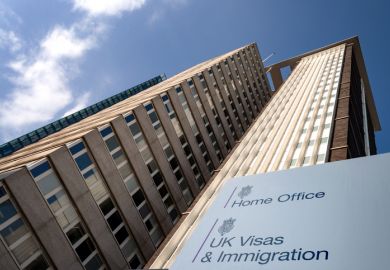When I worked as a top civil servant in the UK, the joke was that you get to the centre of the government and find that there is no centre of government. Harsh, maybe, but the recent furore around limiting numbers of international students would suggest, at the very least, a lack of coordination in the corridors of power.
To be fair, ministers are not always responsible for what ends up in the media. Overexcited special advisers have been known to seed stories without any real understanding of the consequences. But watch out if such kite-flying isn’t denied.
For those in favour of overseas students coming to the UK, there is always a risk of being perceived as cloth-eared, living in an elitist bubble and failing – as was the accusation post-Brexit – to understand public opinion. Or, worse, of being an advocate of open borders.
In my case, nothing could be further from the truth. Any nation needs an effective system for managing those who want to enter its territory, for whatever reason. You don’t need to be a Home Office securocrat to believe that.
Equally, it is entirely legitimate for people to be concerned if their government has no coherent, rational or workable approach to immigration and is undermining its own position domestically and internationally.
That gets to the heart of the story about international students. You can’t, on the one hand, promote an international education strategy and, on the other, have senior members of the government attacking that policy privately and publicly. Well, I suppose you can if you want to give the impression of being a government in its death throes, bereft of serious ideas and lacking any policy or message discipline.
Late-stage governments also become politically inept. As political own goals go, threatening to both cap and confine international students to “elite” institutions was in a class of its own. It revealed a contempt for large swathes of UK higher education, with the perverse outcome that you could be a top-performing institution in the Teaching Excellence Framework but still not be allowed to accept international students.
It also demonstrated a complete lack of understanding of the vital contribution that international students make to parts of the country that the government had previously affected to be concerned about. Those contributions aren’t just financial, but let’s not shy away from talking about the financial consequences of capping international numbers.
In my Whitehall days, we talked endlessly about incentives and how you can prompt different kinds of behaviour. Capping home undergraduate tuition fees at £9,250 for years has become the most efficient incentive to recruit internationally. What else can a university do but look for income from elsewhere – not least to protect the educational experience of UK students?
Assessing public opinion is always difficult, but it appears that students coming into the country legitimately for a fixed period is not people’s top concern about immigration. A simple plea to take international students out of net migration numbers, however, fails to capture the nuance of students and graduates on different types of visas – a point recently made by the Office for National Statistics. A better response could involve encouraging policymakers to find more sophisticated ways to measure these various populations.
At the local level, universities need to work with councils and businesses to ensure a warm welcome for international students. Nothing is more likely to undermine the case for them than local hostilities.
We also need to be on the front foot in raising concerns about the system with the visa-issuing authorities, such as around pre-arrival financial viability checks. And it is smart politics, as well as good policy, to have an open discussion about both the positive and negative consequences of emerging trends, such as rising numbers of students bringing dependants with them. Support for increasing international enrolments should never blind you to the fact that the system may not be perfect.
But for all that, welcoming large numbers of international students remains one of the great assets of UK higher education. For government ministers to undermine that is the best definition I know of national self-harm.
Sir David Bell is vice-chancellor and chief executive of the University of Sunderland and a former Whitehall permanent secretary.
POSTSCRIPT:
Print headline: Own goal in class of its own
Register to continue
Why register?
- Registration is free and only takes a moment
- Once registered, you can read 3 articles a month
- Sign up for our newsletter
Subscribe
Or subscribe for unlimited access to:
- Unlimited access to news, views, insights & reviews
- Digital editions
- Digital access to THE’s university and college rankings analysis
Already registered or a current subscriber?








